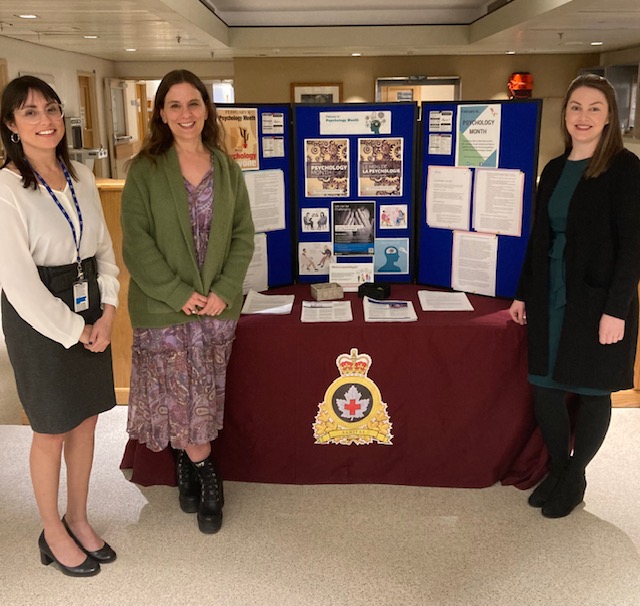
Psychology Month: DND Psychologists serving CAF Members
By Chimène Jewer, M.Sc., R.Psych,
Psychologist, General Mental Health
Canadian Forces Health Services Centre (Atlantic)
February is Psychology Month, which is a great opportunity to highlight the role and contributions of DND psychologists serving CAF members across CFB Halifax as well as those in the civilian community.
What is a psychologist? Psychologists specialize in understanding human behaviour and treating mental health issues. A psychologist, “studies how we think, feel and behave from a scientific viewpoint and applies this knowledge to help people understand, explain and change their behaviour,” according to the Canadian Psychological Association (CPA). Psychologists work in clinical settings, research and/or education. They conduct assessments and perform psychological testing. They can make diagnoses of mental health conditions, and they provide treatment for mental health issues, including counselling/psychotherapy and other evidence-based treatment. Psychologists often work in collaboration with other members of the healthcare team such as psychiatrists, family physicians, mental health nurses, and social workers. Psychologists may be generalists or may specialize in certain areas; for example, mood and anxiety disorders, personality disorders, addictions, eating disorders, and posttraumatic stress disorder (PTSD).
Psychologists have extensive education and training. Psychologists have a graduate degree (Master’s or Doctorate degree) in an applied field of psychology. Graduate school for psychology is typically six to ten years, which includes extensive coursework and practica, followed by two to four years of residency/internship and/or supervised practice, then a comprehensive licensure exam.
When you think about your mental health, it is important to remember that things like stressors, anxieties, ups and downs in mood, occasional sleeplessness, etc. are all normal. It’s okay not to be okay sometimes. There is a continuum of severity with mental health issues, just like there is with physical health. In mental health, there are some psychosocial stressors, and then there are more serious disorders and mental illness. Thankfully, nowadays there are lots of great resources (online resources, apps, self-help books, etc.) that can help people improve their mental health on their own. Sometimes, all that may be needed are some resources to help the person cope – things like a mental health day to rest, engaging in good self-care, exercise, sleeping, talking to a friend, etc. can help things get better on their own, with time. This could be compared to taking an over-the-counter remedy for a cold, then watching and waiting to see if things get better on their own. Try some of these things first, give it time, and remind yourself that some of this is normal. However, if problems persist for several weeks or more, affecting your ability to function with your day-to-day life, relationships and work, then it may be time to seek mental health care. If you are still struggling to function and feel like you can’t get back to yourself, then it may be time to present to your doctor for screening, and they will determine if you need to be referred to a psychologist.
What can you expect from psychological treatment? Psychological treatment is so much more than just “talk”. While a good friend or family member can listen and be supportive, a psychologist has the skills, education, and professional training to help you manage mental health issues. Psychologists have extensive training in a variety of evidence-based treatments, depending on the patient’s circumstances. For example, one treatment is specifically designed to assist patients to increase their motivation, another involves changing negative patterns of thinking and behaviour, another involves developing better distress tolerance skills, and yet another involves changing behaviours to better match the patient’s values and beliefs. Treatment may involve homework outside of the therapy session, which might include reading material about your mental health issue, tracking thoughts and behaviours, practising skills, and trying out new behaviours outside of the therapy session. Most therapy tends to be short-term, and most problems can be addressed with a course of therapy between eight and twelve sessions.
Canadian Forces Health Services Centre (Atlantic) (CF H Svcs C (A)) currently employs eight psychologists in Mental Health Services. In general, CAF members at CFB Halifax have greater, timelier access to psychology services than the general civilian population. At a ratio of approximately one psychologist for approximately every 815 members, CFB Halifax has nearly double the number of psychologists compared to what is available to the general civilian population of Nova Scotia.
Our psychologists work in three different Mental Health departments. There are two psychologists currently working in the General Mental Health Program (GMH), where the focus is on assessing and treating non-service-related mental health conditions, such as depression and anxiety. We have one psychologist working in our Addiction Prevention and Treatment Program (APT), where the focus is on substance abuse and dependency and other addictions, and we have four psychologists in the Operational Trauma and Stress Support Centre (OTSSC), which focuses on service-related mental health conditions or Operational Stress Injuries (OSIs). For more information on Mental Health programs, consult CF H Svcs C (A) on the DWAN, http://halifax.mil.ca/cfhsvcsca/.
Our psychology team is a diverse and well-trained team with extensive clinical experience. Our psychologists have all had experience working in the civilian healthcare sector, in a variety of inpatient and outpatient settings, before bringing this expertise to CAF health services. Most of our psychologists have been serving the CAF for several years and have become quite familiar with the mental health needs of CAF members. Some of our psychologists have even spent most of their careers serving CAF members.
Our psychologists are well-trained to treat common presenting problems, such as: depression and anxiety; adjustment issues; work and relationship problems; personality disorders; trauma; etc. In addition, most have added areas of specialty where they have done extra training and/or research. For example, some of our psychologists have additional speciality training in areas including trauma; addictions; health psychology; forensic psychology; human sexuality; gerontology; eating disorders and body image dissatisfaction; and chronic pain. Several of our psychologists also have additional training in highly specialized treatment methods, such as Eye Movement Desensitization and Reprocessing (EMDR) therapy and Dialectical Behavior Therapy (DBT).
All of our psychologists are registered in good standing with The Nova Scotia Board of Examiners in Psychology (NSBEP) www.nsbep.org, the regulatory body whose mandate is to protect the public by ensuring that providers are properly trained and qualified. For more information about psychologists, consult NSBEP, the Association of Psychologists of Nova Scotia (APNS) www.apns.ca, the Canadian Psychological Association (CPA) www.cpa.ca and/or the American Psychological Association (APA) www.apa.org
For more information about psychology month, visit www.apns.ca or www.cpa.ca/psychologymonth/





